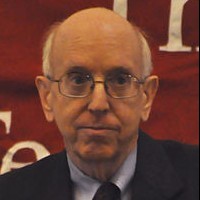Why did Posner retire? He cites 'difficulty' with his colleagues on one issue

Judge Richard Posner.
Judge Richard Posner had intended to stay on the federal appellate bench until he reached 80, an age he believed to be the upper limit for federal judges.
But on Friday, at the age of 78, he abruptly announced his retirement from the Chicago-based 7th U.S. Circuit Court of Appeals, effective the next day. The reason is due to “difficulty” with his colleagues over the court’s treatment of people who represent themselves, he told the Chicago Daily Law Bulletin in an email.
“I was not getting along with the other judges because I was (and am) very concerned about how the court treats pro se litigants, who I believe deserve a better shake,” Posner said. The issue will be addressed in an upcoming book that will explain his views and those of his colleagues “in considerable detail,” Posner said.
Posner said he did not time his retirement to allow President Donald Trump to appoint his replacement. “I don’t think it’s proper for judges or justices to make their decision to retire depend on whom they think the president will appoint as replacements,” he told the Law Bulletin. With Posner’s retirement, the 7th Circuit has four vacancies.
Posner was appointed by President Ronald Reagan in 1981, and was widely considered a conservative. He has since written more than 3,300 judicial opinions, and not all please conservatives, according to the Law Bulletin. On the one hand, he struck down the Illinois ban on carrying weapons in public, called for fewer restrictions on domestic surveillance, and limited class certification in class-action lawsuits. But he has also written opinions favoring abortion rights and same-sex marriage.
In a 2012 interview with National Public Radio, Posner said he has become less conservative “since the Republican Party started becoming goofy.” But he won’t remain above the fray in politics.
He told the Law Bulletin that his retirement will allow him to assist his cat, Pixie, in a run for president in 2020. Above the Law had endorsed Pixie last year, but Posner was unable to participate in the campaign.
“I am optimistic that by [2020] the public will be fed up with human presidential candidates, whether named Trump or Clinton,” he told the Law Bulletin.
Currently a senior lecturer in law at the University of Chicago Law School, Posner identified other future pursuits in a statement about his retirement on Friday.
“I am proud to have promoted a pragmatic approach to judging during my time on the court, and to have had the opportunity to apply my view that judicial opinions should be easy to understand and that judges should focus on the right and wrong in every case,” he wrote.
“I look forward to continuing to teach and publish, with a particular focus on social justice reform.”
Posner told the Daily Law Bulletin that he believes his greatest impact was his advocacy for an economic analysis of the law. In an article for Bloomberg View, Harvard law professor Cass Sunstein agreed, calling Posner “probably the world’s most influential legal thinker over the last half-century.”
“Posner’s approach has a deceptively simple starting point: We should focus insistently on the real-world consequences of legal rules,” Sunstein wrote.
Related article:
ABAJournal.com: “Judge Richard Posner retires from the 7th Circuit after 36 years”



